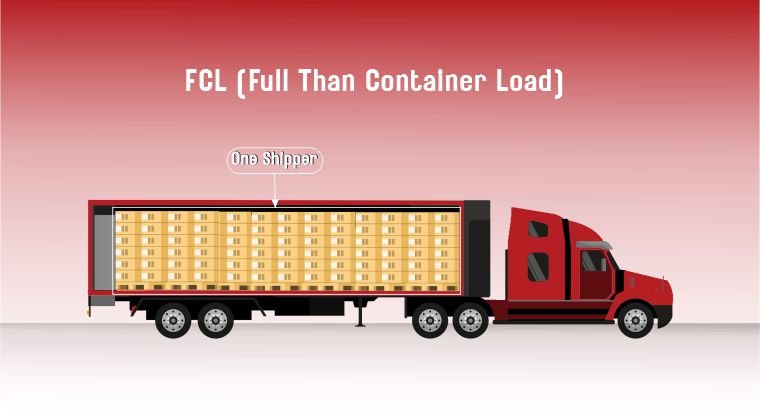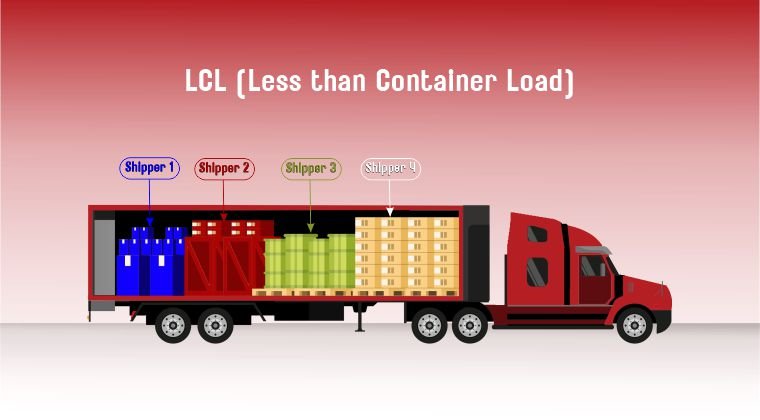Choose Between FCL and LCL Shipping – When it comes to International Shipping, businesses often face the decision of whether to use Full Container Load (FCL) or Less than Container Load (LCL) shipping. Each option has its advantages and disadvantages, depending on factors such as shipment size, budget, and urgency. This article explores both methods, helping you choose the best option for your shipping needs.
Understanding FCL and LCL Before Deciding to Choose Between Them

What is FCL?
Full Container Load (FCL) refers to a shipping method where an entire container is used by a single shipper. The container is filled with goods from one company and is shipped directly to the consignee without being consolidated with other shipments.
Advantages of FCL:
- Security: Since the container is dedicated to one shipment, there’s less risk of damage or loss from handling.
- Speed: FCL shipments typically have fewer delays, as there’s no need for consolidation and deconsolidation.
- Cost Efficiency for Large Shipments: For large volumes, FCL can be more cost-effective, as the rate per unit of cargo is usually lower.
Disadvantages of FCL:
- Higher Costs for Smaller Shipments: If your cargo doesn’t fill an entire container, FCL may be more expensive.
- Storage Requirements: You may need sufficient storage space to accommodate the entire shipment upon arrival.

What is LCL?
Less than Container Load (LCL) is a shipping method where multiple shippers share space in a single container. Each shipper pays for the space their cargo occupies, making it ideal for smaller shipments that don’t require a full container.
Advantages of LCL:
- Cost-Effective for Smaller Shipments: You only pay for the space you use, making it a budget-friendly option for smaller shipments.
- Flexibility: LCL allows businesses to ship smaller quantities without waiting to fill a full container.
Disadvantages of LCL:
- Longer Transit Times: LCL shipments often take longer due to the need for consolidation and deconsolidation.
- Higher Risk of Damage: Since goods from multiple shippers are combined, there’s a higher risk of damage from handling.
Factors to Consider When Choosing Between FCL and LCL
Shipment Size and Volume
The size and volume of your shipment are crucial in deciding between FCL and LCL. FCL is typically more cost-effective for large shipments, while LCL is better suited for smaller loads. If your shipment can nearly or completely fill a container, FCL is usually the better choice.
Budget Considerations
Budget is another important factor. FCL generally offers a lower cost per unit of cargo for large shipments but can be expensive if you’re not utilizing the full container space. On the other hand, LCL allows you to share container space and costs with other shippers, making it more economical for smaller shipments.
Urgency and Delivery Time
FCL is generally faster because the container moves directly from the shipper to the consignee without additional handling. If your shipment is time-sensitive, FCL might be the better option. LCL, while cost-effective, can take longer due to additional processing at the port.
Security and Risk
FCL offers greater security because the container is sealed and handled as one unit. There is less risk of damage or loss compared to LCL, where multiple shipments are combined. If your cargo is fragile or valuable, FCL can provide greater peace of mind.
Some of the risks that often occur include, Bad weather which is sometimes unpredictable, and sea monsters that are often featured in some movies (actually never seen)
Conclusion: Making the Right Choice
Choosing between FCL and LCL depends on your specific needs and circumstances. For large, time-sensitive, and valuable shipments, FCL is often the preferred choice. However, if you have a smaller, less urgent shipment and want to save on costs, LCL can be a viable option.
Ultimately, understanding the pros and cons of each shipping method and considering factors like shipment size, budget, urgency, and risk will help you make the best decision for your business. Whether you choose FCL or LCL, both options offer unique advantages to cater to various shipping requirements.
